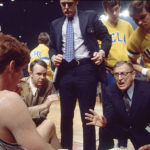Restaurateur and Food Network star Bobby Flay attended several funerals as a kid.
He grew up in New York, where his friends were in involved in organized crime, and he spent weekends visiting them in jail. School didn’t interest him, so he dropped out at 17 to work in a restaurant.
Flay says he could have gone in the wrong direction, but just as he questioned what he was going to do next, cooking saved his life.
Since stumbling into the kitchen, Flay has opened several restaurants, such as Bar Americain, Bobby Flay Steak, Bobby’s Burger Palace, Gato and Mesa Grill. Then he appeared on Food Network in 1994. And since then, he’s hosted several TV shows, including Bobby Flay’s Barbecue Addiction, Food Network Star and Iron Chef America. He is also the author of 12 cookbooks, including Brunch @ Bobby’s and Bobby Flay’s Burgers, Fries & Shakes.
Related: Do You Have What It Takes to Be an Entrepreneur?
Contributing editor and best-selling author Don Yaeger caught up with him to find out what it takes to achieve true quality and why it’s important to know how to win and lose gracefully:
Don Yaeger: Mentors were real drivers in your early success. Who were some of those mentors?
Bobby Flay: I think my No. 1 mentor is my dad. He has always given me simple, short concise nuggets of good things to think about that are always sort of ringing in the back of my head. My other mentor is Jonathan Wax, who I worked for as a young cook. He’s one of the first people to show me what good food was. He exposed me to kitchens that did things in a way better way than I was doing it. Just in terms of approach, technique, ingredients and the quality of the cook that I was cooking next to. That’s how you learn.
DY: In Beat Bobby Flay, you come off with such confidence. Where does that confidence come from?
BF: You come to Beat Bobby Flay and you beat me, I’m not gonna be upset about it. You got me, fair and square. Congratulations. My confidence is that, what’s the worst that can happen?
DY: So the idea to “Beat Bobby Flay” was to create a platform for other chefs?
BF: 100 percent. Now that being said, I try every minute. I’m a competitive guy. It’s my form of athleticism—it’s culinary athleticism. But even in my cooking shows, they’re just an extension of how I cook at home or how I cook in my restaurants—what I’m thinking about in terms of ingredients. Nobody is telling me what to do. Nobody is telling me what to cook. Nobody is telling me what to say.
DY: If you could name a failure that changed you the most, what would that failure be?
BF: Restaurants are like Broadway shows. They all have runs. Some of them are long and some of them are short, but they all have runs. So I don’t think of those as failures at all. But about 10 years ago The New York Times re-reviewed Mesa Grill. They took a [rating] star from me. And it just made me rethink what I was doing, and I think that when you try to operate at such a high level in this business, both in quality, but also in visibility, you’re just wide open.
DY: Is there any extra pressure on Thanksgiving, being a world-class chef?
BF: Yes. When you’re the chef to your family or amongst your friends, they don’t want to know if you’re cooking; they want to know what you’re cooking. But if that’s the toughest pressure in my life, I’ll take it.
DY: Favorite kitchen utensil and why?
BF: I think probably the zester. You can zest all kinds of citrus. The thing people forget about citrus is that when you buy a lemon or a lime or an orange, you’re leaving all the real flavor on the outside of the citrus. It’s free, so you might as well utilize it.
DY: If you could eat only one food for the rest of your life, what would it be?
BF: Ice cream—something in the vanilla base.
DY: What are you learning today to make you better?
BF: I think I’m learning what I want now. I’m very happy at 50 and I’m happy to be 50. I like my role in the world that I live in now, which is doing what I want to do, being able to cook in the restaurants I want to cook in, writing the books I want to write and also mentoring younger people who really want to do this.
DY: How do you define success?
BF: Being content. When I think of success, I think of sitting at my house in Amagansett. We built a pergola. I rented a house in Sicily a few years ago and they had this outdoor pergola with this beautiful wooden table outside and we ate every meal out there. They call it al fresco, outside. So when I’m making lunch for 12 of my friends and we are sitting under the pergola at my house in Amagansett and we’re just drinking lots of Rosé and eating lots of fun, simple delicious food, I’m sitting there just feeling like a tiny buzz from the wine and just enjoying the food and watching everybody else enjoy it. The fact that I’m able to do that and be a part of that—to me, that’s success.







